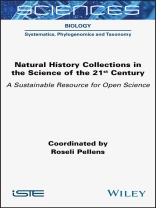Natural history collections have recently acquired an unprecedented place of importance in scientific research. Originally created in the context of systematics and taxonomy, they are now proving to be fundamental for answering various scientific and societal questions that are as significant as they are current.
Natural History Collections in the Science of the 21st Century presents a wide range of questions and answers raised by the study of collections. The billions of specimens that have been collected from all around the world over more than two centuries provide us with information that is vital in our quest for knowledge about the Earth, the universe, the diversity of life and the history of humankind.
These collections also provide valuable reference points from the past to help us understand the nature and dynamics of global change today. Their physical permanence is the best guarantee we have of a return to data and to information sources in the context of open science.
Tentang Penulis
Roseli Pellens is a researcher in macroecology and systematics for conservation at the Institute of Systematics, Evolution and Biodiversity, France. Her research interests include openness and sharing in science, and the contribution of natural history collections as a sustainable source of data and inspiration.












